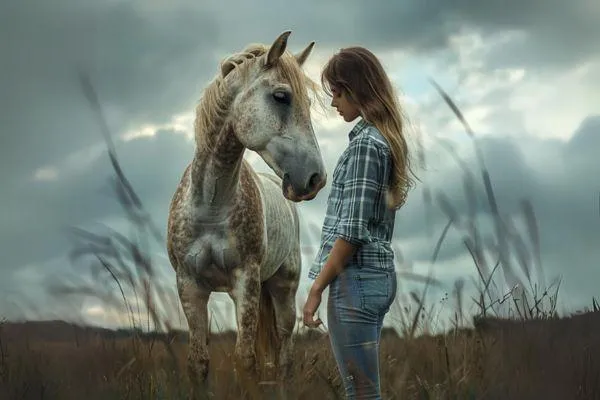Sport Hypnotherapy Blogs
Learn more about Hypnosis & Mindset Coaching and how they can be applied to your life!

The Psychology of Riders - A Journey of Mindset and Influence
The Psychology of Riders - A Journey of Mindset and Influence
Navigating the equestrian world is as much about understanding ourselves as it is about understanding our horses. Just as horses face challenges in new environments, we, as riders, also confront significant psychological shifts. Our experiences, shaped by early authority figures and renowned equestrians, play a pivotal role in forming our mindset and actions.
The Impact of Early Influences
From a young age, many of us are guided by parents, trainers, and coaches who instil foundational principles about riding and horse care. These early lessons create a blueprint for how we perceive and interact with horses. If these authority figures emphasized caution, control, or even fear, these sentiments can deeply influence our future interactions with horses.
The Formative Years as a Youngster or as an Older Rider:
The early years of our equestrian journey are critical. During this period, we are like sponges, absorbing information, attitudes, and behaviours from those around us. Parents who may have had their own fears or concerns about horse riding might pass these anxieties onto us, often without realizing it. Statements like "Be careful, horses are unpredictable" or "Always stay in control" can become deeply embedded in our psyche, shaping a cautious or even fearful approach to riding.
For riders who come into the sport at a later age, the challenges can be different but equally impactful. These individuals might bring a different set of fears and apprehensions, often related to physical vulnerability and a heightened awareness of potential injuries. Unlike younger riders who may not fully grasp the risks, older beginners tend to approach riding with a more cautious mindset. This can be compounded by previous life experiences, such as past injuries or negative encounters with horses, making the process of building confidence and trust more complex. Additionally, societal expectations and self-imposed pressures to quickly master the skills can lead to frustration and self-doubt. Understanding and addressing these unique concerns is crucial for helping latecomers to the sport develop a positive and rewarding relationship with riding.
Trainers and Coaches:
Trainers and coaches also play a significant role. Their methods and attitudes towards training and horse care can either build our confidence or reinforce a sense of insecurity. A trainer who prioritizes safety and control over building a trusting relationship with the horse may inadvertently instil a mindset focused on managing risk rather than enjoying the ride. Conversely, a supportive and encouraging trainer can help us develop a more balanced and confident approach, emphasizing the importance of communication and mutual respect between horse and rider.
Peer Influence:
Peers and fellow riders also contribute to our early experiences. Riding in a group where competition and comparison are prevalent can foster a mindset of self-doubt and pressure to perform. On the other hand, being part of a supportive community that celebrates progress and personal growth can enhance our confidence and enjoyment of riding.
Long-Term Effects:
The long-term effects of these early influences are profound, whether you start riding as a child or as an adult. Riders who grow up with, or are exposed to, a foundation of fear and caution may develop a fixed mindset, where challenges are seen as threats rather than opportunities for growth. They may become overly focused on controlling their horse and avoiding risks, leading to a tense and unfulfilling riding experience. On the other hand, those who receive positive reinforcement and encouragement are more likely to develop a growth mindset, viewing challenges as opportunities to learn and improve.
The Role of Famous Horse People
As we grow and immerse ourselves deeper into the equestrian world, we often look to famous horse people for advice and inspiration. Their methods and philosophies can either reinforce our existing beliefs or challenge us to adopt new practices. The impact of these influencers is profound, as their success stories and techniques shape our aspirations and approach to riding.
The Power of Influence:
Famous horse people hold a significant sway over the equestrian community. Their accomplishments and public personas make them authoritative figures whose opinions and methods are highly respected. Riders often look to these experts for guidance, hoping to emulate their success. This can be both beneficial and detrimental, depending on how we interpret and apply their advice.
Reinforcement of Beliefs:
For many riders, the teachings of famous equestrians reinforce existing beliefs. If a rider has grown up with a cautious approach, they may gravitate towards trainers who emphasize control and precision. This can create a cycle where the rider’s fixed mindset is continually reinforced by the expert’s methods. While this can lead to improvements in technical skills, it may also limit the rider’s willingness to explore new approaches and take calculated risks.
Challenging Existing Beliefs:
Conversely, some famous horse people challenge riders to step outside their comfort zones. Trainers who advocate for a more holistic and empathetic approach to riding can inspire riders to rethink their relationship with their horses. These influencers often emphasize the importance of building trust, understanding the horse’s perspective, and developing a partnership based on mutual respect. This can be transformative for riders who have been stuck in a cycle of fear and control, encouraging them to adopt a more open and growth-oriented mindset.
Balancing Authority and Intuition:
One of the key challenges for riders is balancing the authority of famous horse people with their own intuition and experiences. While expert advice is invaluable, it’s essential to remember that each rider-horse partnership is unique. Blindly following a one-size-fits-all approach can lead to frustration and disillusionment. Riders must learn to trust their instincts and adapt expert methods to fit their individual circumstances.
The impact of early influences and famous horse people on our mindset as riders cannot be overstated. By understanding how these factors shape our beliefs and attitudes, we can take proactive steps to develop a healthier, more confident approach to riding. Embracing a mindset of continuous learning, self-reflection, and adaptability will not only enhance our skills but also deepen our connection with our horses, leading to a more fulfilling and harmonious equestrian experience.
Mindset Formation and Its Effects
The development of our mindset begins early in life and is often rooted in our formative experiences and the authority figures who shaped our understanding of the world. For many riders, this includes parents, trainers, and early mentors who introduced them to horses. These early experiences create a foundation of beliefs and attitudes that can either empower or hinder our growth as riders.
When authority figures emphasize caution, control, or fear, these messages can embed themselves deeply in our psyche. A child who is constantly told to be careful around horses or who witnesses negative experiences may develop a mindset that views riding as inherently risky and fraught with danger. This can lead to a fixed mindset, where the rider believes that their abilities are static and unchangeable, and any deviation from the known and familiar is met with anxiety and resistance.
As we progress in our equestrian journey, the influence of renowned horse people can further shape our mindset. These individuals, often seen as experts, can reinforce existing beliefs or challenge us to adopt new ones. However, the tendency to place these figures on a pedestal can lead to an overreliance on their methods and opinions, sometimes at the expense of our own intuition and experiences. This can create a sense of inadequacy or self-doubt, particularly when our personal experiences don’t align with the advice of these experts.
Facing Uncertainty. The Psychological Impact of a New Horse:
When faced with a new horse, the psychological impact of these ingrained beliefs becomes evident. The unfamiliarity of a new horse's behaviour, responses, and movement can trigger a sense of unpredictability and insecurity. This shattering of expectations disrupts our sense of control and reliability, leading to heightened anxiety and a preoccupation with managing perceived risks. The rider’s focus shifts from enjoying the experience to constant vigilance, emotionally monitoring the horse, and seeking solutions to fix perceived problems. When efforts to resolve these issues repeatedly fail, feelings of guilt, shame, and hopelessness can take root, further eroding confidence and enjoyment.
Breaking the Cycle
Breaking free from the constraints of a fixed mindset requires a deep and conscious effort to understand and reframe our beliefs. It begins with self-awareness and reflection. Acknowledging that our mindset has been shaped by early experiences and influential figures is the first step towards change. This awareness allows us to critically examine the origins of our fears and anxieties and to recognize that they are not immutable truths but conditioned responses that can be altered.
Once we understand the roots of our mindset, we can begin to challenge and reframe these beliefs. This involves questioning the validity of our fears and the authority of those who instilled them. Are these fears based on actual experiences, or are they inherited anxieties from others? Are the methods and advice from renowned horse people suitable for our unique circumstances, or do they need to be adapted to fit our personal journey?
Engaging in positive reinforcement is crucial. Surrounding ourselves with supportive mentors and peers who encourage growth and provide constructive feedback can help rebuild confidence. Positive experiences, even small victories, should be celebrated as they reinforce the belief that change is possible and that we are capable of overcoming challenges.
Mindfulness practices can also play a significant role in breaking the cycle of a fixed mindset. Techniques such as meditation, deep breathing, and visualization can help manage anxiety and maintain a calm, focused mindset. These practices enable us to stay present, reducing the tendency to catastrophize potential problems and allowing us to respond to new situations with greater equanimity.
It’s important for riders to recognize that the ability to change is within their reach, even if it feels foreign or unattainable. Many have been stuck in a particular mindset for so long that the idea of change seems daunting or unrealistic. However, shifting one's mindset is not only possible but also transformative. By acknowledging this potential for change, riders can start to dismantle the limiting beliefs that have held them back. This process involves stepping out of their comfort zone and embracing new ways of thinking and being. It may require patience and persistence, but with the right support and a commitment to personal growth, profound changes can occur. Realizing that mindset transformation is accessible empowers riders to take control of their journey, leading to greater confidence, enjoyment, and success in their equestrian endeavors.
Professional support can be invaluable in this journey. Working with a sports psychologist or a mindset coach can provide personalized strategies to address deep-seated fears and develop a more resilient mindset. These professionals can offer tools to reframe negative thoughts, set realistic goals, and build mental toughness.
Ultimately, breaking the cycle involves a commitment to continuous learning and self-improvement. This doesn’t mean simply seeking out new information but actively engaging in experiences that challenge our existing beliefs and push us out of our comfort zones. By embracing a growth mindset, we can transform our relationship with riding, viewing challenges as opportunities for development rather than threats to our competence.
In conclusion, our mindset as riders is a complex interplay of early influences, authoritative advice, personal experiences, and the attitudes we acquire later in life, especially for those who come to riding as adults. By understanding the psychological roots of our beliefs and actively working to reframe them, we can break free from limiting patterns and develop a more confident, adaptable approach to riding. This journey of self-discovery and growth not only enhances our skills but also deepens our connection with our horses, leading to a more rewarding and harmonious equestrian experience.
Get in touch with us
Before you enquire, please have a good look through our site. We do our best to answer all questions upfront.
For new clients, be sure to watch our Getting Started Presentation which goes over the details of how our clinic runs.
For existing clients, click the Existing Client button to rebook another appointment.
For all other enquiries use the form below and we will get back to you as soon as possible.
0483 955 389
PO Box 56, Tyabb VIC 3913
Mon - Fri 10.00-4.00
Learn More

Disclaimer: Hypnotherapy and coaching services offered on this site are intended for general wellbeing and personal development. They are not a substitute for medical or psychological diagnosis or treatment. Results may vary from person to person.
Follow Us
Follow Us
© Copyright 2025. SPORT HYPNOTHERAPY, All rights reserved.

